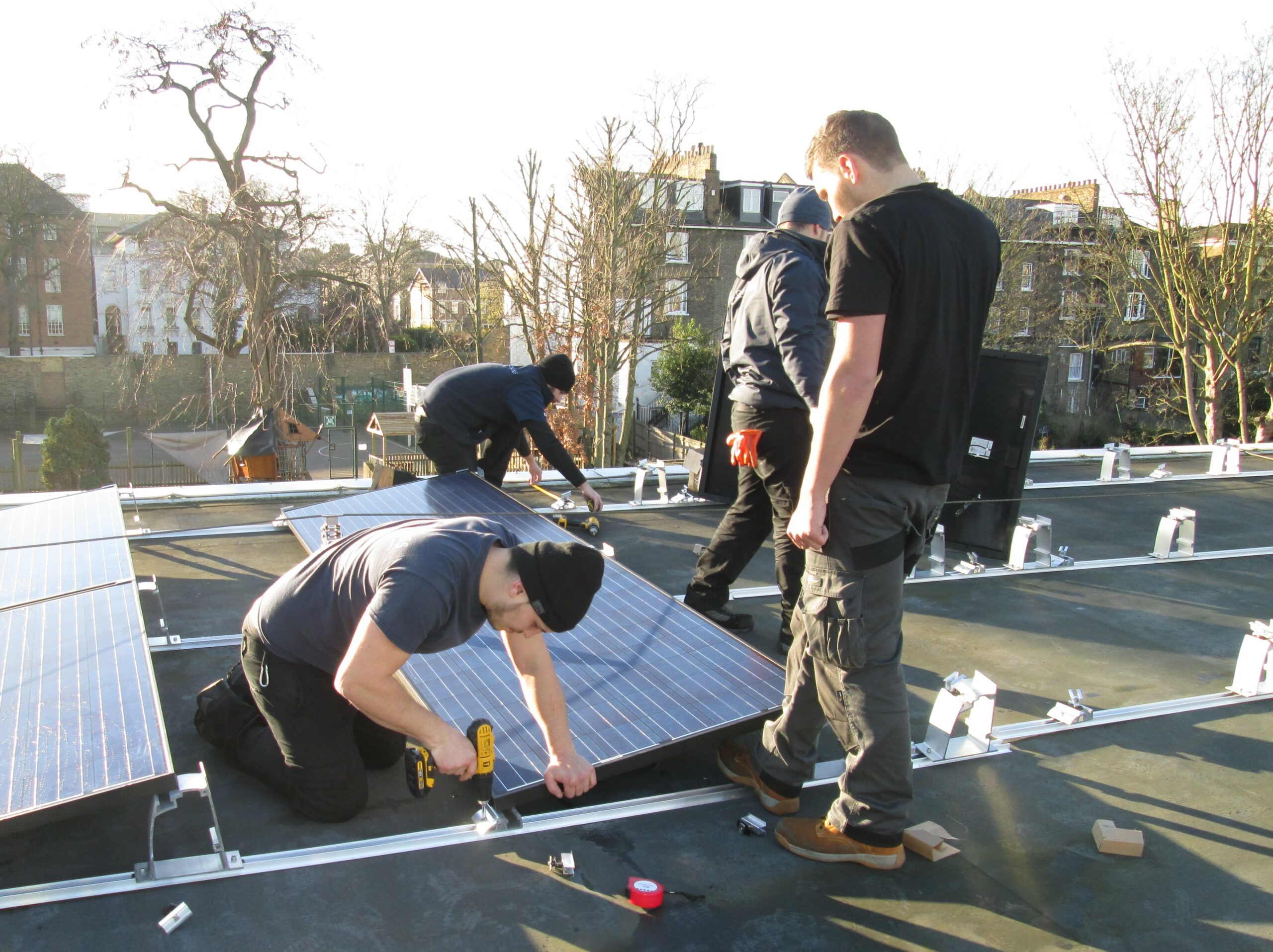Main image: SELCE install solar panels on a school roof
Community energy projects can lower emissions, tackle fuel poverty and spark passion for a more sustainable future. But only if they win the trust of local people. Here’s how two organisations, in Yorkshire and London, are doing just that.
The Tea and PV project, from the Yorkshire North & East Methodist District, has supported the installation of solar panels on churches in the region. The district’s hands-on help has given 18 churches of all sizes, in a range of settings, that chance to generate their own power – showing these installations can work just about anywhere.
The project has also engaged church communities to help them understand the value of the new technology, feel ownership of it, and be inspired by it. To show the power of the new panels, churches translate the energy they generate into a straightforward measure: how many cups of tea you could brew with it. Across the whole project, the total is 820,043 – and counting.
Information about the energy generated is shared on screens at church coffee mornings, but also by a nominated champion in each church community. A person with some expertise in the technology, and the enthusiasm and skills to explain it to others.
Adele Borrowman, who has helped deliver the project, says: “That’s really worked – when someone’s passionate about their topic, they’re happy to share it with others.” She adds that previously, if churches opted to do their own solar installation, knowledge of the benefits would likely be confined to the church treasurer.
Lower bills protect the future of buildings that are a key asset for the wider community, not just the church congregation. For example, in the town of Withernsea, one in ten people are regular or occasional users of the Methodist Church building – as worshippers, or through community groups, clubs and networks that hold sessions in the space, from children’s dance classes to support groups for older people.
The new panels could be the spark for something bigger. Consultant Geoff Robinson from D3 Associates has worked with the district’s churches in Withernsea and elsewhere to develop a pathway to net zero which takes into account financial sustainability.
Solar a “no-brainer” – but confidence building is key
Hundreds of miles away, South East London Community Energy (SELCE) is also working at the heart of local communities. The organisation’s projects include home retrofit advice and installing renewable energy technology – mainly solar panels and LED lighting – at public buildings like schools, leisure centres and community halls.
The building owners pay no up-front costs, and get a guarantee that their monthly bills will be lower. SELCE indemnifies the work, and runs the community share issue that funds it. The installations are “a no-brainer from a financial point of view,” says Cara Whelan, SELCE Project Development and Fundraising Manager. But she warns there are still barriers to be overcome.
“There’s a load of normalising to be done. There’s a fear that things will go wrong. Remember there aren’t people at schools, for example,who have spare time to think about this. The planning processes are long. It’s therefore important that we’re a not for profit that has a reputation in the area. That we’re not here to scam people.
“Public sector organisations, in particular, are overwhelmed and understaffed. Our job is to make it as easy as possible.”
Action on fuel poverty
Surplus finance generated by the installations is used to fund SELCE’s energy advice services, which include running pop-up energy cafes at meetings of community groups. At these sessions people can chat with a SELCE expert about how to lower their energy bills, and where to find more support. Conversations might also lead to a home visit from SELCE, who help households with practical changes like installing energy-efficient lightbulbs.
Once again, building trust is key. SELCE make their sessions as friendly and inclusive as possible, with advice available in different languages, and quieter spaces where people can talk about finances and other potentially tricky topics. “And there’s lots of cake involved,” says Cara.
She adds: “We are invited in [to hold our energy cafes] by community organisations – so we are going where we know there is need. That’s one way of making sure you’re reaching people. And people have gone to these place because they trust the organisation.” She says it’s also vital that SELCE earns the confidence of other professionals and organisations tackling fuel poverty, so a local referral network can get help to where’s it needed.
The Yorkshire North & East Methodist District is also addressing fuel poverty directly – running ‘warm welcome’ sessions in its buildings where people can come, keep warm and get advice. Adele says that there is a desire across the church district to create a fairer, more sustainable, future.
“The twin win is a big thing – churches are wanting to support their local community in a time of hardship and need, and they’ve seen their own bills spiral. The idea they can help the climate and their own community has been popular. The local and global together.”
- Discover more climate pioneers at the 2024 Ashden Awards this June.
